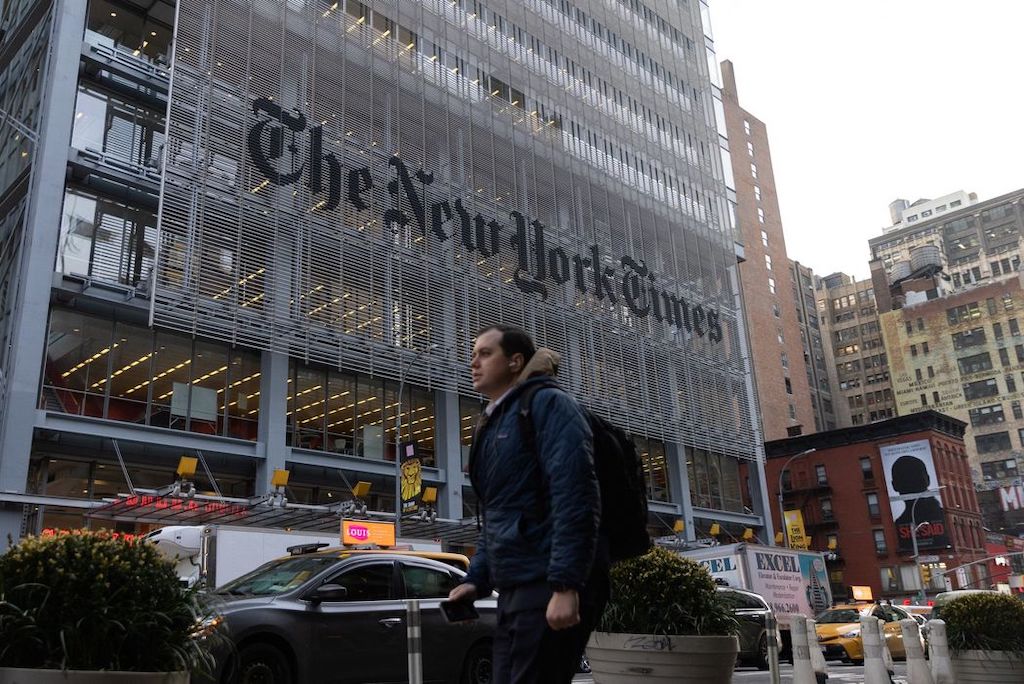/cdn.vox-cdn.com/uploads/chorus_image/image/65473887/1175971649.jpg.0.jpg)
The fight between pro-democracy protesters in Hong Kong and the Chinese government is now playing out on the internal message boards of one of the world’s largest tech companies.
Google employees have set off a fiery company-wide debate in recent days by posting messages of solidarity with Hong Kong protesters in mailing lists and message boards visible to Google’s roughly 100,000 employees. Many are frustrated with the company’s decision to remove a pro-Hong Kong protester mobile game, The Revolution of Our Times, from the Google Play store and feel the company should have handled the situation differently.
The issue was important enough to be addressed by leadership at the company’s most recent all-hands “TGIF” meeting, according to several sources. And the discussions have stoked tensions between employees who support the Hong Kong protesters and believe that tech companies like Google have an ethical imperative to support democratic movements, and some pro-Chinese government employees who say that such discussions are inappropriate on internal listservs.
The Hong Kong debate comes only a few months after Google specifically told employees it was changing the rules of its office culture and that workers need to spend less of their time engaging in political debates at work.
In the past few days, employees have been posting a torrent of messages in support of Hong Kong protesters on Memegen, a popular employee-run internal message board where colleagues regularly comment on current events and company policies.
Since last week, dozens of memes about the Hong Kong protests have racked up thousands of upvotes, a mark of approval similar to a “Like,” from colleagues, according to posts reviewed by Recode.
One popular meme with hundreds of upvotes features a picture of protesters crowding a square in Hong Kong, with the words “#FightforFreedom #StandwithHongKong” up top and “Keep going!” at the bottom.
Other posts criticized Google’s recent decision to take down pro-Hong Kong protester content from its platforms.
One Google employee who asked not to be named said that the company could have better handled the removal of The Revolution of Our Times, which allows players to participate in virtual recreations of the pro-democracy demonstrations.
Google pulled the game, saying it violated a Play Store policy that bans monetization of “sensitive events.” The employee said Google could have reached out to the developer about monetization concerns rather than “simply banning” the game, which they said donated most of its proceeds to charity.
“We have a long-standing policy prohibiting developers from capitalizing on sensitive events such as attempting to make money from serious ongoing conflicts or tragedies through a game.
“After careful review, we found this app to be violating that particular policy and suspended it, as we have done with similar attempts to profit from other high-profile events such as earthquakes, crises, suicides, and conflicts,” said a Google spokesperson.
Google is just one of several tech companies that have made controversial decisions related to the protests in Hong Kong. Last week, video game company Blizzard banned a prominent player who voiced support for the Hong Kong protests. (Blizzard reinstated the player’s prize money and reduced his suspension time following public outcry and a dozen employees walking out of work over the issue.). Apple also recently pulled a pro-Hong Kong protester map tool from its App Store, citing concerns that it could enable attacks on Chinese police.
Meanwhile, some Google employees who seem to disagree with the Hong Kong protesters’ cause have tried to shut down their colleagues’ discussions about Hong Kong, characterizing them as irrelevant to the workplace, uninformed, and offensive.
These comments, use a common line of reasoning from the Chinese government and its supporters: that the issue in Hong Kong is more complicated than Westerners portray it to be and that protesters who fill the streets do not represent a consensus of Hong Kong residents (the Chinese government itself, though, has been accused of spreading disinformation about the protests).
From a business standpoint, the actions of companies like Google, Apple, and Blizzard seem as though they’re meant to appease the Chinese government — which makes sense.
As Peter Kafka has written, upsetting China’s leadership would undoubtedly impact Apple’s ability to do business in the country. That’s a risk that companies like Apple can’t afford. The iPhone maker is a rare US tech giant that’s doing well in the country, which represents its third-largest market with over $44 billion in annual sales.
Meanwhile, other tech companies are still trying to crack the Chinese market, like Google’s highly controversial attempt to build a censored search product for the country (which the company has since said it has canceled).
But from a political standpoint, tech companies’ seeming willingness to placate China is attracting scrutiny from the public and politicians on both sides of the aisle, who have rebuked companies for putting foreign profits over protecting protesters’ freedom of speech in the China-Hong Kong debate.
And now, as these internal Google discussions prove, tech companies are facing dissent from within their own ranks.
“Google used to be a company that adamantly supported democracy, but will it abandon Hong Kong?” one employee, who asked to remain anonymous, told Recode. “It’s time for Larry and Sundar to take a stand.”
Freedom of speech versus cultural sensitivities
While most employees who have posted on Google’s internal message boards vehemently support Hong Kong protesters, a minority of employee commenters have defended the Chinese government.
In one email on the popular listserv Industryinfo, where Googlers regularly post links to tech headlines, one employee posted a link to a news article about how Google removed The Revolution of Our Times.
The first employee to reply to the thread immediately questioned the post’s legitimacy, arguing that the article didn’t belong in the listserv. The employee argued that if the poster had an issue with Google’s decision to remove the pro-Hong Kong protester game from the Play store, they should file a private complaint with the team working on it instead of sharing a news article.
“I would say it is not a IndustryInfo news,” wrote the commenter. “You’d do better to file a bug to Google Play team if you think content is not sensitive; however, I personally believe it is sensitive.”
Another employee fired back, defending the post’s relevance to the mailing list.
“A major industry player — such as Google — censoring content is absolutely *information* about the *industry,*” the employee wrote.
Another employee on the thread questioned whether Google’s decision to pull the app was akin to a country pulling a Nazi app in a country where it’s illegal to post such content — an idea that was critiqued by another commenter who asked, “Did I miss the part where pro-HK apps became illegal in the US?”
For many Google employees defending free speech, China is an especially sensitive subject, given Google’s controversial Project Dragonfly, which was a secretive attempt to develop a custom version of its search engine for China that would blacklist phrases like “free speech.” After the project became public, the company faced internal and external pressure not to build a search product on such terms, and Google eventually said it’s halting its efforts.
Historically, Google has allowed and even encouraged debate on political issues like Project Dragonfly, no matter how big or small. Back in 2008, Google had a huge debate over a “Free Tibet”-themed pie that a company chef served in the corporate cafeteria. The chef was suspended but later reinstated as debate about the incident spurned a then-record-setting 1,000 internal emails in a single day.
But as Google has grown into a bigger company and attracted intense political scrutiny, it’s started cracking down on its rules around speech. In August, the company updated its policies, banning employees from discussing politics at work unless it was relevant to the company’s policies or working conditions.
“While sharing information and ideas with colleagues helps build community, disrupting the workday to have a raging debate over politics or the latest news story does not,” the guidelines state, while at the same time saying that employees are “free to raise concerns and respectfully question and debate the company’s activities,” as it’s “part of [Google’s] culture” to do so.
Clearly, these new rules aren’t enough to deter Googlers from debating the protests. Overall, back-and-forth at Google around the Hong Kong protests represents a broader geopolitical battle that’s now being debated among the workforce of US tech companies.
It’s a fascinating look at how divisive the industry’s policy decisions in China are. And it raises questions about whether companies like Google and Apple are more accurately described as US firms or as nation-states that seek to balance the global interests of their many constituents — both American and, increasingly, Chinese.
source: http://www.vox.com
MARKETING Magazine is not responsible for the content of external sites.










